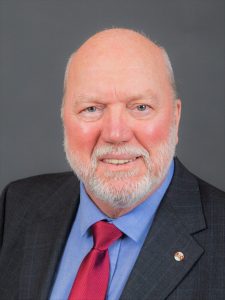
Prof. Paul Young (Photo courtesy the Royal Society of Canada)
CivMin Prof. Paul Young has recently been appointed to the position of International (Foreign) Secretary of the Royal Society of Canada (RSC) and a member of Council. “I felt very honoured and humbled to be asked,” said Young of the appointment. “I’m very happy to take on the role.”
The RSC, founded in 1882, is also known as the Academies of Arts, Humanities and Sciences of Canada. Young has been involved for a number of years as a Fellow of the RSC and served on its Governance and Ethics Committee.
At the University of Toronto, Young’s impressive titles include his current role as Professor Emeritus and Senior Fellow Massey College, and has formerly served as the Vice-President, Research and Innovation (2007-2014), as well as Chair of the Department of Civil Engineering and Director of the Lassonde Institute for Mining. As an engineering geophysicist he has focused his research, and engineering career, on developing seismic methods and instrumentation to monitor fractures and rock quality. Over the past 40 years, he has pioneered techniques for monitoring and interpreting induced seismicity in the mining, petroleum and nuclear waste disposal industries.
Part of Young’s role is to liaise with other global academies and to engage collectively with G7, G20 and Commonwealth initiatives. This is a volunteer role, with a three-year appointment, so he will be continuing with regular U of T activities and commitments in parallel. In essence, the role is to research and assess, “Matters thought to be significant that can be brought to the political arena.”
With in-person meetings, especially those requiring international travel, impossible and now requiring a digital fix Young offered, “I’m now working with other people of the academies on a lot of Zoom calls.” The scheduled G7 meeting of global leaders was to be held in the U.S. this year (a video conference is to be substituted), so required work on scientific statements agreed to be brought forward to the political leaders for consideration. The result is three topics sent to G7 academies: Digital Health, The Nature and Importance of Basic Research, and Global Declines of Insect Populations and Potential Erosion of Vital Ecosystem Services.
When asked if he had sought out or applied for the position, a modest Young declared, “A call came out of the blue,” in reference to contact from the RSC president.
By Phill Snel, Original Story Appeared Here
